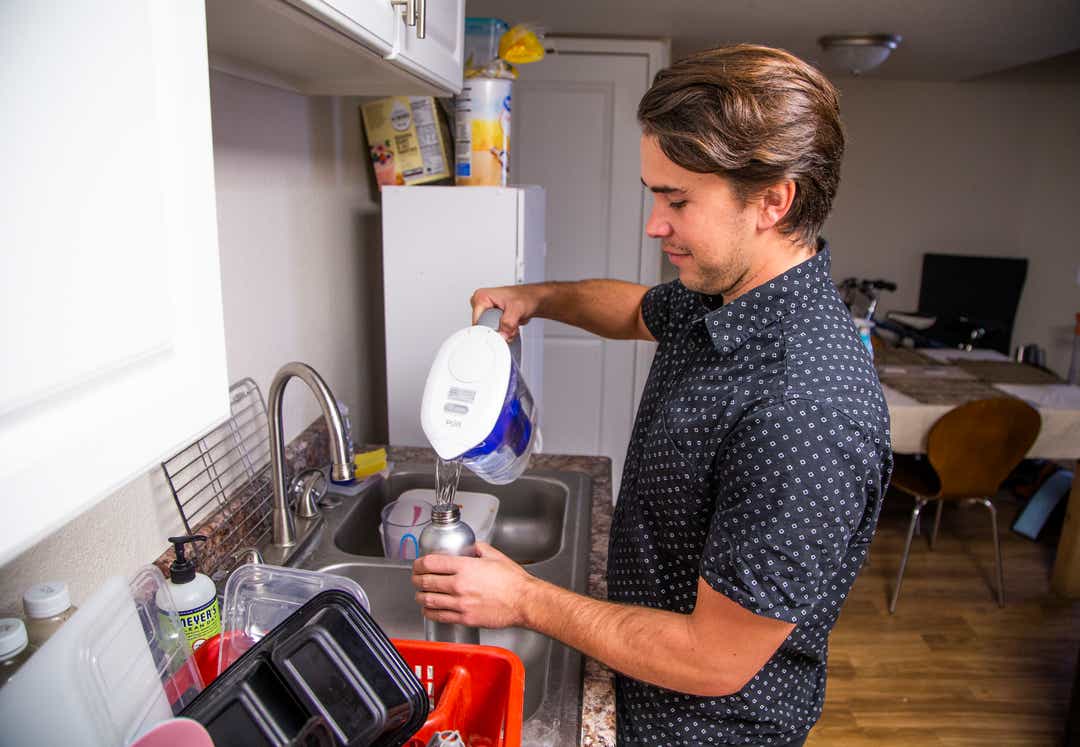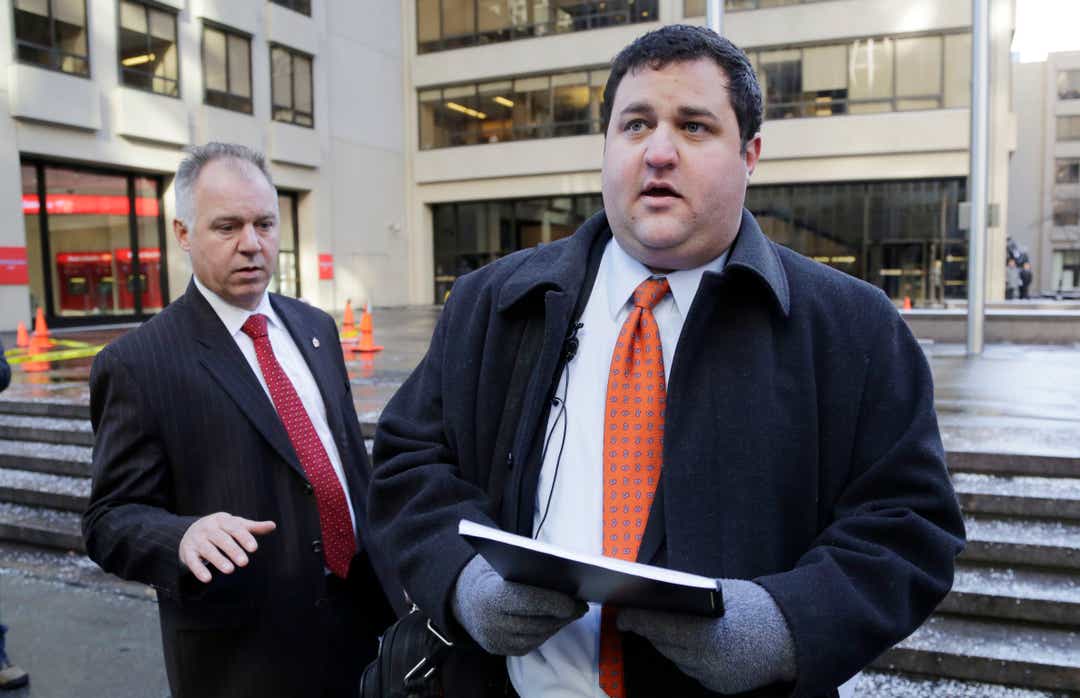Early one morning in March, Madison McIntosh showed up on his day off at the Scottsdale, Arizona, driving range and restaurant where he worked. The 24-year-old sat in his car until the place opened, then wandered around all day, alternating between gibberish and talk of suicide as co-workers tried to keep him away from customers.
When he was still there 12 hours later, the manager contacted McIntosh’s father in Las Vegas, who called police and rallied other family members states away to converge at the young man’s side.
They found a shell of the once-star baseball player. For months he’d been spending his days vaping a potent form of THC, the ingredient in marijuana that makes people feel high, and staying up all night. Now, he was wildly swinging between depression and euphoria.
The family rushed McIntosh to Banner Behavioral Health Hospital, where staff psychiatrist Dr. Divya Jot Singh diagnosed him with cannabis use disorder and a „psychotic disorder unspecified.”
Singh expects to make McIntosh’s diagnosis official soon. If he remains off pot and symptom-free a year after the episode, the psychiatrist can say with certainty he suffered from “cannabis-induced psychosis.”
„What shocked me is that I had never heard of it,” said McIntosh’s dad, Rob. „All you hear is all these proponents of legalization of pot without thought to the risks and the consequences.”
A number of physicians and parents want to see that change. They are pushing back against the long held assertion of users and advocates that marijuana is a safe, benign and even beneficial drug.

Those sounding the alarm include the nation’s „mental health czar” as well as doctors in states including Colorado, California and Massachusetts where marijuana is legal for recreational use. They say the facts are irrefutable: excessive use of today’s high-THC pot and concentrated oil is linked to psychotic episodes that in some cases develop into full-blown schizophrenia.
There is great disagreement, however, over the strength of the science linking pot and psychosis. Advocates on either side of the marijuana debate have different interpretations of the connection reported in a National Academies 2017 report on cannabis and other studies. One from the British medical journal the Lancet released in March showed a two to five times higher risk of psychotic disorders for daily consumers of high-THC marijuana compared to people who never used.
Arguments surround how much of the illness is preceded or worsened by the drug use, how often marijuana is used in response to it and if the psychosis would have occurred anyway.
„At the end of the day, you can’t make a causal statement,” said Ziva Cooper, research director of the UCLA Cannabis Research Initiative and a member of the National Academies panel. „You need to have some biological premise to show that this kind of exposure causes psychotic disorder.”
The federal government and other health officials, however, say the type of psychosis McIntosh experienced and other psychiatric disorders are clearly tied to the drug.
„It is time for Americans to understand there are substantial risks with marijuana,” said Dr. Elinore McCance-Katz, the Department of Health and Human Services’ top mental health official. “This is not the government making up data.”
‘Settled science’
McCance-Katz taught at Yale and Brown universities and held senior posts for state substance abuse agencies before joining HHS under the Obama administration as the Substance Abuse and Mental Health Administration chief medical officer.
She points to a more than doubling of hospitalizations for serious mental health disorders among 18- to 25-year-olds nationally between 2012 and 2018. And she cites a July study that shows a 77% increase in suicide deaths between 2010 and 2015 among Colorado 10- to 19-year-olds with marijuana in their systems.
The data on cannabis-induced psychosis, she said, demands the government both speak out and manage fears. Between 10% and 20% of people who use marijuana will develop a marijuana use disorder and „be at risk for these other kinds of mental and physical adverse events.”
„That’s not the majority; that’s the minority of people who use marijuana, but here’s the problem: We don’t know who they are a priori (in advance),” McCance-Katz said. „We do not want to exaggerate the risks.”
Yet many marijuana users and industry officials say that’s precisely what the Trump administration is doing.
They point to other studies, including a recent one by Columbia University professors in the journal Drug and Alcohol Dependence that showed cannabis use disorder dropped significantly across all ages reporting daily or almost-daily cannabis use between 2002–2016.
Longtime marijuana legalization advocate Mason Tvert said millions of Americans are rightly skeptical about warnings of the dangers of cannabis use, given it’s the most widely used illicit substance in the country.
„When people claim that smoking a joint will lead to psychosis, many consumers are going to write that off, and as a result are going to write off other warnings,” said Tvert, who led Colorado’s first-in-the-nation cannabis legalization effort in 2012 and now works for Denver-based VS Strategies.
Die-hard marijuana advocates strongly push back against news reports that suggest cannabis might have made someone sick, often criticizing such coverage as hearkening back to the days of “Reefer Madness,” the 1936 film that purported to show the drug’s dangers.
When Surgeon General Dr. Jerome Adams included the link between cannabis and psychosis in his August advisory on marijuana’s effect on the „developing brain,” he was trashed and threatened on Twitter. Alex Berenson, a former New York Times business reporter who authored this year’s book, “Tell Your Children: The Truth about Marijuana, Mental Illness and Violence,” also was widely condemned for his warnings of the drug’s dangers.
Tvert said legalization advocates like him want research conducted without bias or political motivation. It’s an area, he says, where the federal government has little credibility.
„That’s what happened for decades,” he said. “The federal government spread misinformation and exaggerated the risks so much that people just started ignoring all the warnings.”
Still, McCance-Katz said it was not a difficult decision at HHS to include the link between marijuana and psychosis in the Surgeon General advisory.
„This has been settled science,” she said. „This is something that has been known for many years, yet there has been virtually no attention paid to it.”
‘Marijuana killed my soul’
Dr. Clay Whiting deals with a lot of parents and other family members at Scripps Mercy Health hospital in San Diego, where he is an emergency room physician. In the last month, he said he’s had back-to-back ambulances with young people experiencing psychosis after trying marijuana for the first time.
Since the drug was legalized in California last year, Whiting said „we see people every shift now” because of marijuana, including some with violent vomiting known as hyperemesis. The incidences led to the term „scromiting,” to describe people screaming and vomiting at the same time.
„Greater access means great trials by younger people,” said Whiting.
USA TODAY interviewed a dozen parents whose children suffered psychotic episodes — some of which led to schizophrenia — related to their marijuana use. Several of the children died by suicide.
Andrew Zorn, of Phoenix, Arizona, was 14 when he started smoking marijuana daily in high school, said his mother Sally Schindel. He was about 25 and working on his community college degree when he told his mother something was going on in his brain. He tried to read and study but his mind seemed to disappear on him, she said.
Zorn was diagnosed with “severe cannabis-use disorder,” bipolar disorder and borderline personality disorder with auditory hallucinations, paranoia and anxiety.
“In a roomful of people, in the midst of conversation, his eyes would just go somewhere else,” Schindel said. “He later realized it was marijuana use causing that, but from that time on, it just grew and grew to where he was more and more disabled.”
Zorn ended up taking his own life. In a suicide note he wrote: “I want to die. My soul is already dead. Marijuana killed my soul + ruined my brain.”
McIntosh’s problems didn’t start until after two years after high school, when his time at Scottsdale Community College ended without being drafted or recruited by a four-year school.
Mourning the loss of a 16-year baseball career, the 20-year-old started vaping THC to feel better. It didn’t work. A report released in October that analyzed 83 studies found marijuana is not effective for the treatment of depression or other mental illnesses. Many physicians say it increases risk and severity of depression, increasing the chances of suicide.
In the weeks leading up to McIntosh’s hospitalization, his brother and roommate, Morgan, grew worried and called their father. McIntosh was staying up all night, he reported, and at 6 a.m. was still awake „doing weird things.”

McIntosh doesn’t remember that time, but the day in March at the driving range is clear. He felt „out of it, delusional” and thought people were following him. „I was pretty scared,” he said. „I didn’t know where I was at.”
When Rob McIntosh and his wife Marie, Madison’s stepmother, arrived at 3 a.m. from his home in Nevada, he said his son seemed “possessed.”
“He was seeing double rainbows and insisting, 'I’m good, Dad.’ It was lunacy,” he said.
After McIntosh was released from the hospital last spring, he said he stopped using marijuana „cold turkey.” He moved to Texas for a while and sold home security systems, before returning to Arizona do similar work in the Phoenix suburb of Mesa.
He’s no longer suicidal or tempted to use marijuana. „I know what I put myself through and my family through,” McIntosh said. „I want to help other people any way I can.”
’Think this through’
In May, more than 40 Massachusetts doctors, psychiatrists, pediatricians and other public health professionals urged that state to add psychiatric risk warnings to marijuana packaging and to prohibit most advertising.
The group cited research in the Lancet that found the use of high-THC marijuana increased risk of first-time psychosis by 50% in Amsterdam. Members said that showed the more potent a drug, the higher the risk, and was further evidence the drug caused the illness.
“Just as not all tobacco use causes cancer, not all marijuana/THC use causes the negative effects, however, the risk is substantial enough to require policies which discourage use,” the group’s report said.
The state’s Cannabis Control Commission rejected most of the health professionals’ recommendations.
„People say, 'this is only THC and THC is harmless.’ That’s the assumption we all have to question,” said Dr. Sharon Levy, a group member and pediatrician who heads the Adolescent Substance Use and Addiction Program at Boston Children’s Hospital. „I don’t think it’s harmless at all.”
She noted growers are looking to use the highest THC strains and companies are making even higher concentrated products, including gummy bears, oils and waxes, some with up to 90% THC.
“This is a business-driven framework, not a public health one,” Levy said. “There are very serious questions on this front.”
The psychotic side effects of marijuana are used to bolster arguments on both sides of the legalization debate. They find common ground in the need for more testing and studies.
Because marijuana remains a Schedule 1 controlled substance, the federal government strictly limits who can conduct research. While Canada and Israel permit far more research access, approvals to study marijuana’s benefits can take years in the U.S. where government-grown marijuana is tightly controlled.
Tests by marijuana-legalization advocates also have found the federal government testing supply can be 10-15% weaker than cannabis sold in state-licensed dispensaries. In the past 20 years, average pot potency has tripled, from 4% THC in 1995 to 12% in 2014, according to federal testing.
Today, it’s possible to buy marijuana flower that’s more than 35% THC. Concentrates like those vaped by McIntosh can contain up to 90% THC.
Bill Carroll, director of the White House Office of National Drug Control Policy, said he talks to the Drug Enforcement Administration daily and is pushing the agency and the FDA to „open up research” and make it possible for those who want to study medical uses of marijuana to obtain the type they want to study. The DEA recently announced plans to register more qualified marijuana growers for the research program, but Carroll told the USA TODAY editorial board earlier this month legislation might still be needed.
More research and stricter regulation would improve both the quality and the fact-based promotion of cannabis, said Dr. Scott Krakower, the assistant unit chief of psychiatry at Zucker Hillside Hospital in Queens, New York. The information also would help legislators better determine if the benefits of legalization outweigh the risks.
He said many marijuana users are familiar with the possibility that smoking cannabis can cause paranoia, and paranoia is a textbook definition of an episode of psychosis, along with hallucinations and a distorted sense of reality.
„I think the biggest problem is that people think THC is a panacea cure for conditions, and they use an exorbitant amount of it” despite a lack of research to back that up, Krakower said.

Tvert acknowledged cannabis use comes with risks, which is in part why his legalization efforts focused on regulating marijuana like alcohol. It requires a delicate balance.
“We do need these potential harms conveyed, but we need them conveyed in a way that is credible and based on evidence,” he said.
McCance-Katz isn’t taking a public stand on whether more states should legalize marijuana for medical or recreational uses, although her skepticism is apparent when she puts quotes around the word „medical” as it applies to marijuana.
„It’s really important the government be responsible and say, ‘You need to know this and think this through before you decide to use.'” she said. „That’s all we want.”
If you or family members are struggling with issues mentioned in this story and you would like to connect with others online, join USA TODAY’s „I Survived It” Facebook support group.